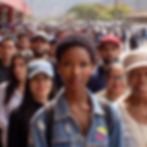Venezuela's crackdown on NGOs makes for "grim 2024 outlook"
- info775148
- 23. 2. 2024
- Minut čtení: 2
Aktualizováno: 28. 2. 2024
February 22, 2024

Credits @FFHR.CZ
Venezuela's tightening grip on the work of non-governmental organizations is a troubling sign as it heads into an election, a human rights observer tells Axios Latino.
Why it matters: NGOs provide key services, such as soup kitchens or prenatal care centers, that people contending with high inflation and acute food and medicine shortages would otherwise be unable to access.
NGOs are also sometimes the only organizations documenting government malfeasance or human rights violations, says Jimena Reyes, director for the Americas at the International Federation for Human Rights.
Driving the news: President Nicolás Maduro's government ordered the closure of the local UN human rights office last week.
Authorities argued the international body had a "colonialist attitude" and supported "impunity" when the office said the due process of recently detained activists should be respected.
The National Assembly, which is held by the ruling United Socialist Party of Venezuela (PSUV), is also in the final stages of passing a law that the UN recently warned will criminalize nonprofit work and likely lead to the dissolution of many groups.
What they're saying: "These moves happen in a general climate of democratic breakdown," Reyes tells Axios Latino.
"There is currently no judicial independence in Venezuela. On top of this, the (NGO) law is being voted on, and there's been an increase in arbitrary detentions."
"It makes for a grim 2024 outlook," she says.
Venezuela is following in the footsteps of undemocratic nations such as Nicaragua, which expelled UN officers after they pointed out mistreatment of people in massive anti-government protests in 2018.
The Nicaraguan government then criminalized NGOs and arrested dissident voices in the lead-up to 2021 elections, when President Daniel Ortega, who has been in power since 2007, essentially ran unopposed for re-election.
The Red Cross, shelters for homeless youths, an agricultural development group and a nun order linked to Mother Teresa are among the more than 3,000 NGOs that have shut down in Nicaragua in the last few years.
The other side: The Venezuelan and Nicaraguan regimes argue their NGO laws are aimed only at fiscal transparency.
What to watch: On March 1, the International Criminal Court will decide whether a case against the Venezuelan government for suspected human rights violations will continue after Venezuela appealed to dismiss.
The U.S. has also set a mid-April deadline for Venezuela to allow opposition figures like María Corina Machado, whose primary win is being contested by the PSUV-controlled courts, to run in the elections, warning it will otherwise reinstate sanctions on the oil and gas industries.
There is no set date for the presidential election yet, just an estimate that it'll be in the latter half of the year.
Source: axios.com





